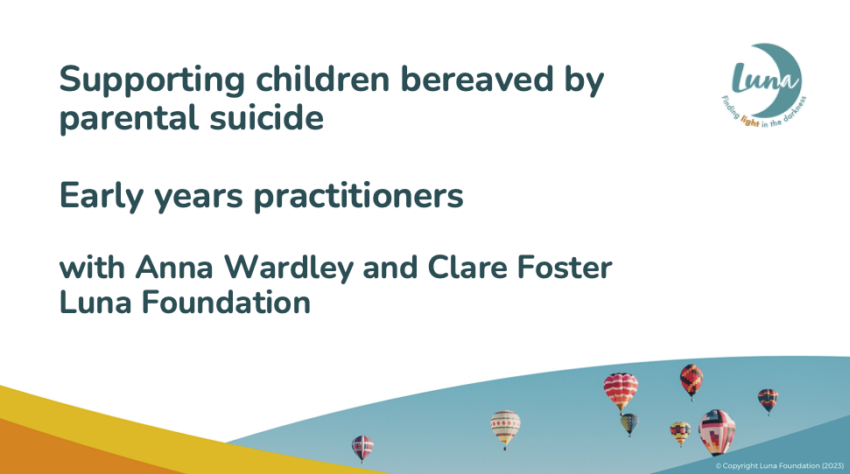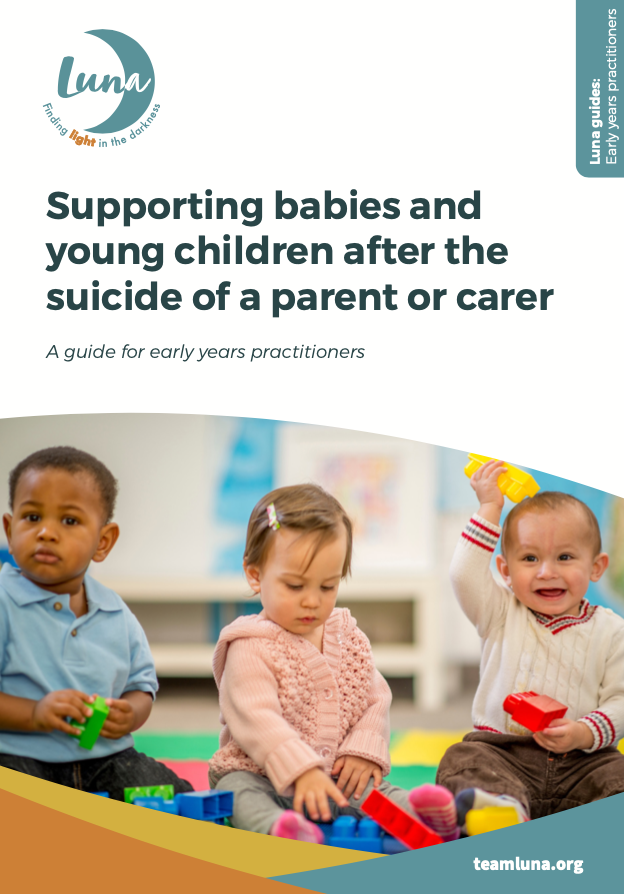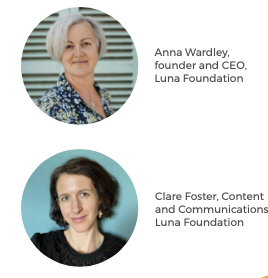It’s a startling fact. Most people I’ve trained, or spoken to, during my work with the Luna Foundation assume that young people bereaved as teenagers are at a greater risk. We’ve certainly seen situations where the focus is on supporting older bereaved children and really just ensuring the basic needs of the younger child are met. It’s a common assumption that they don’t really ‘get it’ and are not really grieving in a significant way.
This research (published in the Lancet Psychiatry in 2022) studied over four million people in Denmark. They also found that children are slightly more at risk if they lose their mother to suicide (although losing their father also led to increased risk), that the actual suicide attempts often happen at age 15-19 and those who do attempt suicide often use the same method as their parents.
After this study was published, Luna asked me to start researching and developing specific training and resources for early years practitioners. As well as a lot of reading and desk research, I conducted focus groups and interviews with early years practitioners from a range of settings to understand more about the different issues involved in supporting this vulnerable group.
Luna estimates that approximately seven children aged 0-5 lose a parent to suicide each day. This is based on Winston’s Wish estimate of 9,000 under-18s per year, 25 per day. That’s 25 children going to bed tonight having had their world turned utterly upside down. It’s also worth remembering that suicide is the leading cause of maternal death during the first year after pregnancy – something I’m only too aware of in my work with Action on Postpartum Psychosis.
Thank you Anna and Clare it has been heartening and very helpful to hear of the important and practical information you are sharing with Early Years settings, so they can support young children having a voice in their family bereavement experience
Training participant
Why do we see this impact on early years children?
We don’t know exactly. More research is needed. But there are a number of relevant factors.
- Babies and young children express grief and trauma differently, in ways that are not always recognised and understood by their parents or carers. They may not get the support they need to process and regulate these strong and often overwhelming emotions, leading to greater trauma.
- We know early years (aged 0-5) is a vital age in children’s development. Early childhood trauma has been associated with reduced size of brain cortex. These changes may affect a child’s ability to regulate emotions and lead them to grow up feeling fearful, unsafe and unprotected.
- Even if a surviving parent or primary carer is able to recognise the grief and trauma responses in their children, and knows how best to support them, their own grief and shock may make it difficult to support their child effectively. We know that secure attachments with primary caregivers help protect children against future mental health problems. When this attachment is fractured, children become more vulnerable.
Children bereaved by parental suicide are not only left trying to understand why a parent took his or her own life, but also have to cope with the impact on the surviving caregiver, who may not be able to provide the support they need.
Mitchell and Terhost 2017
Luna’s training for early years practitioners
Early years practitioners can play a vital role in supporting the child and their family after a suicide bereavement. The 16th – 22nd November was Children’s Grief Awareness Week. Over the course of this week, Anna Wardley (Luna’s inspirational founder and CEO) and I delivered five three-hour training sessions to early years practitioners in Greater Manchester. It’s been intense – and a unique way to spend the morning of my 40th birthday. It’s also very affirming to see the number of people committed to getting this support in place.
Absolutely amazing training. I found it really helpful and great resources to help children and families.
Training participant
The training explores why suicide bereavement is different and the long-term impact it can have on an unsupported child. It looks at grief at different levels of development and how caregivers can recognise and support grieving children. We share practical evidence-based, guidance for talking to children about suicide, supporting the family, safeguarding, policy and supporting others in the setting, along with case studies and examples.
It’s been really well received so far. We’ve had over 20 participants signed up each day, from a range of early years backgrounds. Many of them have reported how pleased they are to have something focused on the early years and how helpful they have found the training. A number of the participants were currently supporting children bereaved by suicide in their settings which gave the sessions a sense of immediacy and highlighted the real importance of having a plan in place.
You are an inspiration, thank you both so much for this evening delivery. At such a late hour. I have taken so much from it. Thank you.
Training participant
It’s one of the projects I’m most proud of this year. I very much hope it starts to make a real difference to babies and children who desperately need support and advocacy. And I would encourage anyone working with children (in early years or older) to contact Luna Foundation about commissioning training.
Very grateful for this information delivered in a lovely sensitive way that reflects your depth of knowledge and experience
Training participant
The content for this course was very well organised and information shared was clear and concise in all areas. The tutors were engaging, personable and extremely knowledgable. Such a vital training course for all those working with young children.
Training participant



